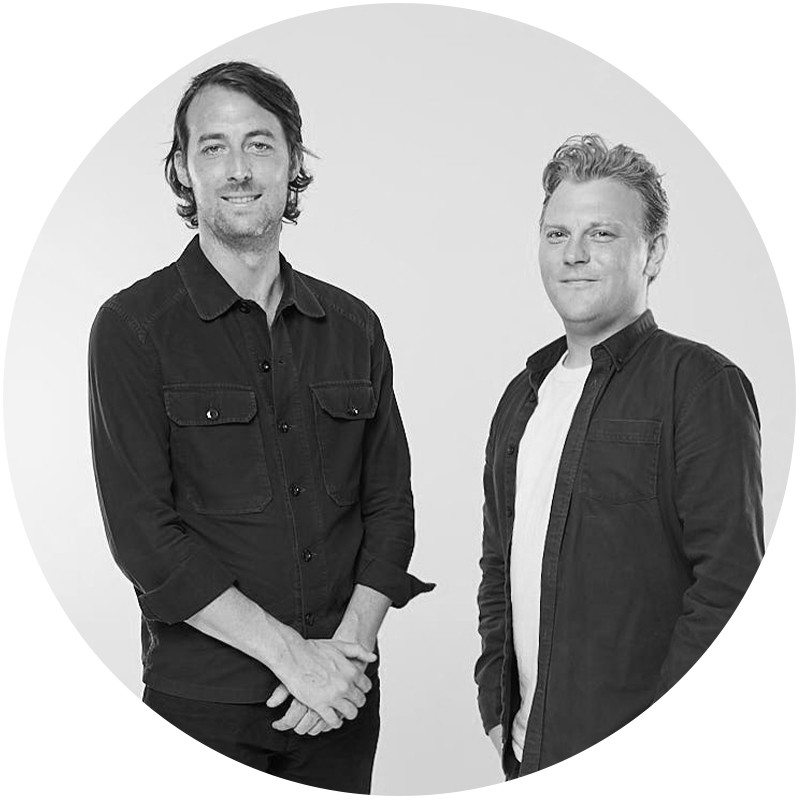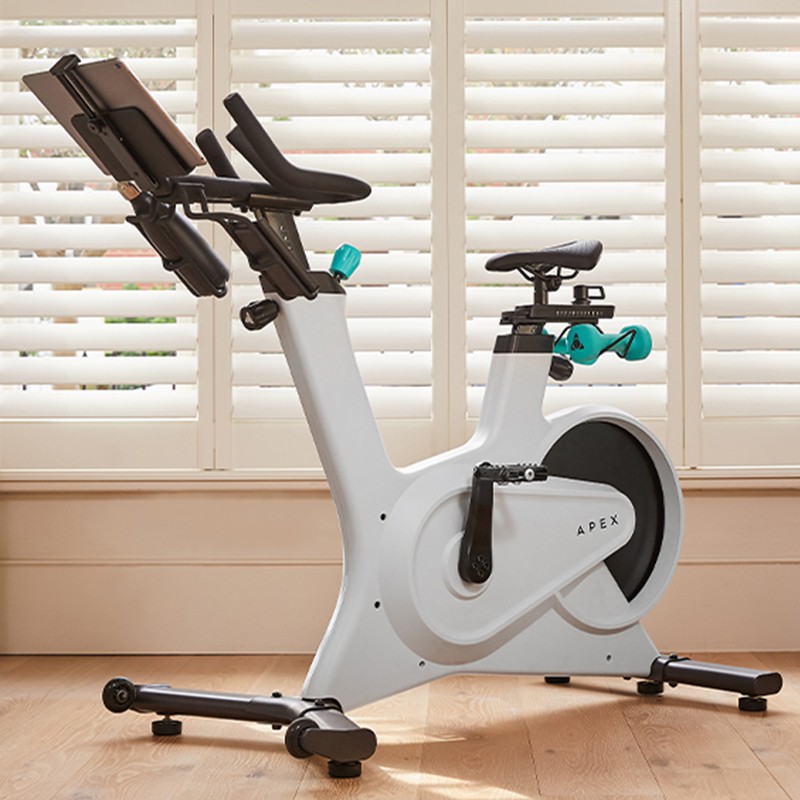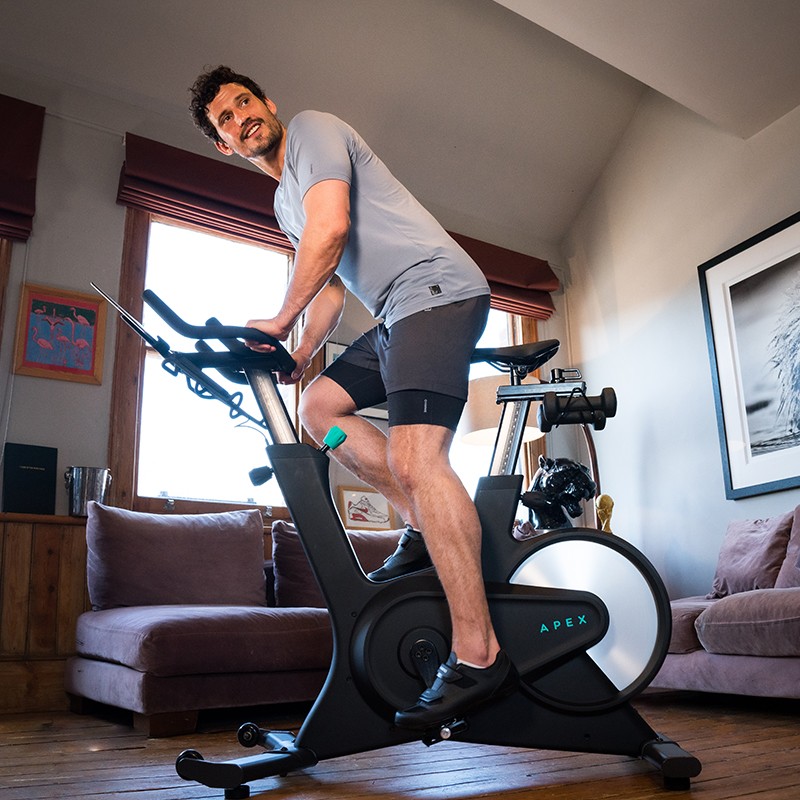How We Launched A Business During Lockdown

So it seems like at-home spin bikes are having a moment right now…
Simon: Spin bikes have always been a compelling product because they provide an excellent form of cardio and don't take up too much room. New technology means we can also now bring the feeling of being in a class with a world-class instructor right into your home.
Charlie: All true, but they have also been so uncool for a long period of time! The tech has enabled a connectivity that’s making them much more fun and appealing.
Where did the idea for Apex Rides come from?
Simon: We saw which direction the market was heading from what was happening across the pond. The two of us sat down over a long dinner on a weekend and brainstormed. The big question was: if we launch something like this, how do we do it differently and more appropriately for the UK market? I wanted to build a brand and product that was not only pioneering, but good value, accessible and inclusive. From day one, it’s been a case of innovating not replicating.
Charlie: It wasn’t just dinner – there was some wine too. Group exercise classes were growing more popular in the UK and we saw how technology was beginning to disrupt the way people would attend these classes. The convenience factor of being able to exercise on your own terms, in your own time and without the hassle of lugging sweaty clothes in a rucksack around London is what initially attracted us to the sector.
What convinced you there was a market for Apex?
Charlie: There are a number of high-quality spin studios in London and I would find myself having to book a week in advance or join a waitlist to attend a £20 class. I was convinced that giving customers the opportunity to attend unlimited classes from anywhere in the country, on their own time schedule, and for a very affordable monthly fee, would work as a business model.
Simon: To validate the concept, we started reaching out to every boutique fitness studio we could find to see if they would be keen to partner with us. It could well have been an uncomfortable conversation, given we were looking to bring out a product which could detract from their customer base, but we found everyone wanted to talk to us. It proved that we all knew which way the market was going – if you can't beat them, join them. Ultimately, we found the perfect partner in Boom Cycle.
What were you doing before Apex and how did that help you?
Simon: I was part of a technology start-up working in business development and spent a few years consulting at an early-stage venture fund prior to that. Being exposed to high-growth start-ups, seeing what they did right but also learning from their mistakes has turned out to be priceless experience.
Charlie: I worked for six years as an investment manager, analysing companies and investing client money into a wide array of different assets classes. It gave me a good understanding of what investors look for in a business and what strong business models look like. I also gained an appreciation of how super-trends in consumer behaviour impact businesses. Just as importantly, I witnessed the pitfalls that some business fall into and learnt what to avoid. That said, nothing can really prepare you for running your own business.
You successfully raised a seven-figure sum for Apex Rides. How did you do that?
Simon: Non-stop networking. Warm introductions are always best but reaching out cold works too. Build lists, follow up, be prepared. The ultimate goal is to get to a position where investors approach you.
Charlie: But getting to that point certainly isn’t easy. Raising our first round of investment was probably the hardest part of the journey so far. Armed with simply a PowerPoint presentation, you need to persuade investors to believe in your vision and your ability to achieve it.
What advice would you now give to someone who’s chasing capital for a new business?
Simon: Ultimately, whatever you're doing won't be for everyone, so you need to be resilient. If an investor says no, learn from that meeting and move on to the next.
Charlie: Keep going and keep adapting. Listen to advice and feedback from anyone you have pitched to.
What stage were you at with Apex when the pandemic took hold?
Simon: We were fairly far in. We'd built the brand, designed and got our bike ready for manufacture. We’d started filming content and had completed most of the dev work on our app. Having said that, we still knew we couldn't deliver tomorrow, so we came to market with a pre-sales campaign which allowed droves of early adopters to join us on the journey from the very beginning.
How has the pandemic changed what you’ve done since?
Simon: Our market's been supercharged in every sense, which has been great for Apex launching and gaining exposure, but on the flip side it's created new players and made the landscape more competitive. The supply chain on a global level has also been very challenging.
Charlie: We are definitely one of the lucky businesses to benefit from the stay-at-home culture.
What advice would you give to anyone preparing to launch something at the moment?
Simon: Adversity breeds opportunity. The world as we knew it has changed for the foreseeable, so there will be tons of brand-new, real-life problems that need solving. I say get out there and give it your best!
Charlie: There is definitely still appetite for investment in certain sectors. Speak to as many people as possible to gauge interest early on.
And how are things going for Apex right now?
Charlie: Very well. The bikes have arrived and we can't wait to get them into customers’ homes.
Simon: We're just really looking forward to finally rewarding our customers for their patience. One of the benefits of launching that pre-sales campaign is that we’ll have a ready-made community of riders from the very first day bikes are in homes. We also launch with John Lewis next month and with Christmas and get-fit Jan around the corner, it should make for a busy few months.
Pandemic aside, has launching a business been as you expected it to be?
Simon: I think it's impossible to anticipate what launching any business entails – until you actually do it. No two days are the same and those days are long, but I wouldn't want it any other way.
Charlie: It has been very hard, but we never anticipated it to be easy. It's certainly not for the faint hearted.
What have you learnt since launching Apex that you would love to go back and tell your pre-launch selves?
Charlie: It’s a marathon not a sprint. I’d also tell myself to try and enjoy every day despite the stresses.
Simon: Buckle up, you're in for a hell of a ride!
Could you have launched all of this on your own?
Charlie: Absolutely not. Having a business partner is crucial.
Simon: Yes, I think having a co-founder is super important – and I imagine it's the same in any start-up. There are stresses and strains and we don't always agree, but we have a strong bond. With shared responsibilities, you’ll halve the stress. In our case, it helps that we've known each other since we were eight.
How have your skillsets complemented each other’s?
Charlie: I'm still trying to figure this out, but they definitely do.
Simon: I'd say I'm more right side of the brain: creative, but I very much enjoy doing deals. Charlie is more left-sided – good with numbers and detail. So between us, we make one full brain!
The big name in spin bikes right now is Peloton. You’re competing with them on price – how have you managed to keep your prices low?
Simon: The world is full of screens, tablets and mobile devices these days, so we’ve built a Bluetooth bike and developed software that allows the customer to use their own device. Removing the screen from the bike has removed a lot of the cost.
Charlie: There’s also no need for us to have expensive retail shops in super-prime locations.
What else do you think makes Apex a decent proposition and helps it to cut through?
Simon: When we began building a brand for Apex, we wanted to create something inclusive and encouraging that went against the grain of the competitive and athletically skewed players on the market. Apex is about people getting on the bike, having fun and getting a sweat on. We’ve also devoted a lot time to both the functionality and design of our bike. We offer it in four neutral colours to match customers’ interiors.
Charlie: Essentially we don’t take ourselves as seriously as the competition – our UK-based instructors are epic but also relatable. I also happen to think we have the best-looking bike on the market, which helps.
Are at-home spin bikes here to stay even if we all get comfortable going to the gym again?
Simon: Absolutely. We began designing this product well before Covid arrived because we recognised a need for a cost-effective and time-efficient way of working out. People are increasingly time poor. In today's Netflix/Amazon Prime culture, they want high quality and they want it right now.
What’s your short-term ambition for Apex?
Simon: There is a massive opportunity in the UK for Apex to lead on product innovation in the wellness sector and build a brilliant brand that people will trust and recommend to their friends.
Charlie: In other words, we want to create a very happy community of Apex customers who love the product.
And medium term?
Simon: One step at a time! But I do see Apex as an all-round at-home fitness and wellness brand. We'll look to expand our offering with cutting-edge hardware, advanced technology and world-class content, as well as expanding internationally. I’m very keen to keep innovating our offering – it’s key to keep evolving just as people’s lives do. Our developers are very talented and a few of them come from gaming, AR and VR backgrounds – these are just ideas at the moment, but watch this space.
Finally, how are we all going to be exercising in ten years’ time?
Simon: Given the rate at which technology evolves these days, it’s almost impossible to imagine. Robot PTs? Laps around Mars? It also depends on whether we're out of lockdown by then.
And what will Apex’s involvement be, do you reckon?
Simon: We’re here to give the people what they want!
SIMON’S THREE TIPS FOR ANYONE THINKING OF STARTING THEIR OWN BUSINESS…
- Find a clear proposition that solves a genuine customer problem in a large target market.
- Surround yourself with good people – especially fellow entrepreneurs and people who've done what you're doing.
- Follow your gut instinct. It's almost never wrong.
…AND CHARLIE’S
- Listen to advice but ultimately make your own decision.
- Find a business partner who shares your vision and has the hunger to achieve it.
- Keep going.
Find out much more about Apex Rides here.
DISCLAIMER: We endeavour to always credit the correct original source of every image we use. If you think a credit may be incorrect, please contact us at [email protected].



